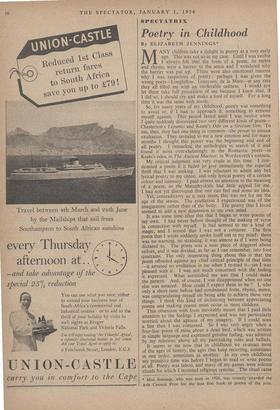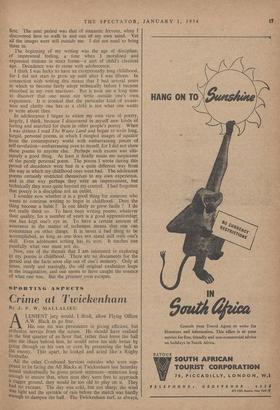Poetry in Childhood
By ELIZABETH JENNINGSŌĆó ANY children take a delight in poetry at a very early age. This was not so in my case. Until I was twelve 1 always felt that the form of a poem, its metre and rhyme, were a barrier to the sense and I wondered why the barrier was put up. There were also emotional reasons why I was suspicious of poetry: perhaps I was given the wrong poetsŌĆöLongfellow, Tennyson, de la MareŌĆöat any rate they all filled me with an intolerable sadness. I would not let them take full possession of me because I knew that, if I did so, I should' cry and make a fool of myself. For a long time it was the same with music.
So, for many years of my childhood, poetry was something to avoid or, if I had to approach it, something to armour myself against. This period lasted until I was twelve when I quite suddenly discovered two very different kinds of poem- Chesterton's Lepanto and Keats's Ode on a Grecian Urn. To me, then, they had one thing in commonŌĆöthe power to arouse exultation. They revealed to me a new emotion and for many months I thought this power was the beginning and end of all poetry. I ransacked the anthologies in search of it and found it most overwhelmingly in the Romantic poetsŌĆöin Keats's odes, in The Ancient Mariner, in Wordsworth's sonnets.
My critical judgment was very crude at this time. I con- demned a poem if it failed to give immediately the especial thrill that I was seeking. I was reluctant to admit any but lyrical poetry to my canon, and only lyrical poetry of a certain colour and intensity. 1 paid almost no attention to the meaning of a poem, so the Metaphysicals had little appeal for me. I had not yet discovered that one can feel and sense an idea. Yet, contradictory as it may seem, this was not for me the age of the senses. The exultation I experienced was of the imagination rather than of'the body. The poetry that 1 loved seemed to add a new dimension to my own mind.
It was some time after this that I began to write poems of my own. I had never before thought of the making of verse in connection with myself. It had seemed to me a kind of magic, and 1 sensed that I was not a conjurer. The first poem that I wrote suddenly spoke itself out in my mind: there was no warning, no straining, it was almost as if I were being dictated to. The poem was a neat piece of doggerel about sailors, and it was divided, as far as I can remember, into four quatrains. The only interesting thing about this is that the poem offended against my chief critical principle of that time ŌĆöit aroused no exultation in me when I re-read itŌĆöyet I was pleased with it. I was not much concerned with the feeling it expressed. What astonished me was that I could make the pattern., And, of course, I was disappointed when no one else was amazed. How could I expect them to be ? I, who only a short time before had condemned form, rhyme, metre, was congratulating myself on being able to achieve these very things. I think this kind of dichotomy between appreciating poems and making poems must occur in most children. This obsession with form inevitably meant that I paid little attention to the feelings I expressed and was not particularly worried about the aptness of my imagery. If I could scan a line then I was contented. So I was very angry when a four-line poem of mine about a dead bird, which was written in simple language and expressed genuine feeling, was' admired by my relations above all my painstaking odes and ballads. It seems to me now that in childhood . we re-enact most of the ages of histofy, the ages that keep recurring, sometimes in one order, sometimes in another. In my own childhood my primitive time was before I began to read or write poems at all. Poetry was taboo, and many of my games were solemn rituals for which I invented religious systems. The ritual came ŌĆó Miss Jennings, who was born in 1926, was recently-awarded the Arts Council Prize for the ,best first book of poems of the year. The beginning of my writing was the age of discipline, of impersonal feeling, a time when I moralised and expressed truisms in strict formsŌĆöa sort of child's classical age. Decadence was to come with adolescence.
I think I was lucky to have an exceptionally long childhood, for I did not start to grow up until after I was fifteen. In connection with writing this meant that I had several years in which to become fairly adept technically before I became absorbed in my own reactions. But it took me a long time to discover that one must not write outside one's own experience. It is ironical that the particular kind of aware- ness and clarity one has as a child is not what one wants to write about then.
In adolescence 1 began to widen my own view of poetry, largely, I think, because I discovered in myself new kinds of feeling and searched for them in other people's poetry. When I was sixteen I read The Waste Land and began to write long, turgid, personal poems, in which I mingled images of squalor from the contemporary world with embarrassing pieces of self-revelationŌĆöembarrassing even to myself, for I did not show these poems to anyone else. Perhaps such excess was ulti- mately a good thing. At least it finally made me suspicious of the purely personal poem. The poems I wrote during this period of decadence were bad in a quite different way from the way in which my childhood ones were bad. The adolescent poems certainly restricted themselves to my own experience. and in that way perhaps they were an improvement, but technically they were quite beyond my control. I had forgotten that poetry is a discipline not an outlet.











































 Previous page
Previous page